|
|
Waterprojects > Current
Projects
Current
Projects
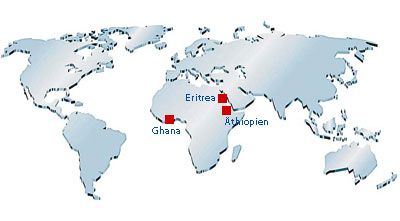
|
|

Eritrea
|
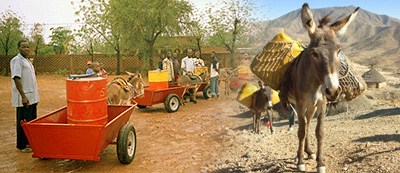 |
|
|
|
Donkey as Water carrier
For the completed Donkey Project in Eritrea from 2002 to
2004, money was provided for the purchase of 600 donkeys
and their medicine for worm treatment.
In
this regard the foundation is currently involved in Ethiopia
and Burkina Faso.
.
Background
More
frequent and longer dry periods due to global climate changes
leave wells to run dry and increase the distances to water
sources. Most afflicted are the women and girls who have
to travel long distances often for hours a day with heavy
canisters, buckets or calabashes on their backs to collect
drinking water for their families. That ruins their health
and often even not meets the family needs.
In
contrast persons who possess a donkey or a camel as water
carrier need not longer ruin their health by carrying water
and also come home with multiple quantities of water. The
water surplus can be sold, divided with neighbours or used
for the cultivation of food. The children can attend school
instead of gathering water. It is not unusual that the “four
leggers” help the families to survive.
Where donkeys are distributed
In
Ethiopia, in the region Sire in the province Arsi.
In
Burkina Faso, in the province Soum in the north of the country.
Goal
In
remote areas, where there are neither wells nor other water
sources, and no potable water supply is planned in the
near future, the intention is to help the lives of the
weakest: “single old people, widows with children
and especially poor families” with the distribution
of donkeys and camels. Whoever receives a donkey or a camel
also gets medicine for the worm treatment of the animals.
Partners
Ethiopia:
ORA International Deutschland e.V
Burkina
Faso: Freunde Djibos e.V.
Expenses
A donkey
in Ethiopia costs 90 Euro, including the water skins. A
donkey in Burkina Faso costs 85 Euro. A water
cart with water barrel costs 300 Euro.
Monitors
Ethiopia:
ORA International Deutschland e.V.
Burkina
Faso: Frater Jacques Fellmann of the Order White Padres
in Djibo
Contact Person
Henner
Lang
Phone:
+49
(0)
8179/1313
E-Mail:
hennerlang@t-online.de
Realization
Burkina
Faso: Purchase and distribution are at any time possible
with Frater Jacques Fellmannn in Djibo.
Ethiopia:
Purchase and distribution are at any time possible. The
donkeys are bought at a nearby Sunday market and distributed
to families, who possess no donkey still.
A committee
registers each new donkey owner. |
|
|
|

Eritrea
|
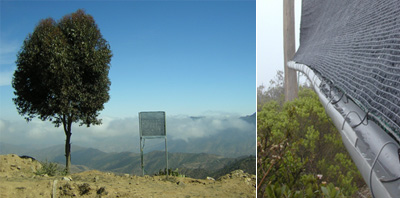 |
|
|
Drinking Water from Fog in Eritrea
Background and Circumstances
Similar
conditions and meteorological realities prevail in Eritrea
as in Yemen: High altitudes close to the ocean, where much
fog occurs that drifts, but does not fall as rain. In
Yemen the Canadian Non-Governmental Organization “FogQuest” installed
large, mesh covered collectors and successfully collected
water from fog. Subsequently, the WaterFoundation
contacted the Canadian Non-Governmental Organization FogQuest.
In
January 2005 a FogQuest member and the staff of “Haben” an
Eritrean Non-Governmental Organization set up small test
collectors at five locations in the fog region of Eritrea.
The result was promising: On the average 12 litres of drinking
water could be "harvested" per square meter of
mesh. FogQuest specializes in the installation and
use of fog collectors. These collectors have been installed
very successfully for years in countries with high fog density
but no precipitation. This occurred predominantly in
South America and in Yemen. After the successful evaluation
of the feasibility study in Eritrea, 25 large fog collectors
were set up there. One fog collector produces approximately
180 litres water per day in the dry winter season.
For
more information: www.fogquest.org/Projects
Goal
Every,
twenty, 40qm fog nets should provide two schools and the
villages Nefasit and Arborobu with drinking water.
Partners
The
Canadian NGO FogQuest and the Eritrean NGO Vision
Eritrea
Expenses
Approximately
30,000 Euro are needed for the collectors, the building
of water pipelines and water reservoirs.
Monitor
WaterFoundation
Realization
At
the beginning of 2007 staff members were several weeks
in Eritrea to train and brief the Eritrean colleagues.
The
project management, Kerstin Anker and engineers of Vision
Eritrea were several days in March 2007 on-site and
during this time ZDF (the Second German television channel)
interviewed and filmed. The results were broadcasted on “World
Water Day” on several German television stations. The
final completion of this project will be done by the Vision
Eritrea and the involved local villagers.
Contact Person
Kerstin
Anker
Phone:
+49
(0)
89-29003731
E-Mail: kan@knorr-rechtsanwaelte.de |
|
|
|

Eritrea
|
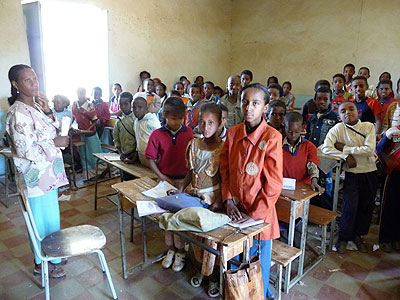 |
|
|
|
The World’s First WaterSchool*
in Eritrea
The WaterFoundation together with experts, local authorities,
partners and the local community develop a holistic concept
for the regional water supply in a manageable area of Eritrea.
This
includes
the
production
and supply of water, sewage disposal, water preservation
and deforestation. This project emphasizes the cooperation
of
the population, especially children and students. As a result,
the focus of the concept is schools which multiplies the
effects.
The WaterSchool a source of information for the
population
The
Waterschools
intend
to motivate and give practical examples of sustainable water
management and strengthen the ecological awareness of the
population. There you will find modern locally adapted irrigation
and water conveyance technologies as well as sanitation facilities
to inspect and reverse engineer.
Learning for the future
In
the WaterSchool the children learn for their future.
Apart
from
regular
class
they
learn
for example, how they can develop the water resources of
their
homeland and sustainably preserve
it.
The
curriculum
also
covers subjects
like
water supply, water management, erosion control, the conservation
of soil, groundwater protection, deforestation, agriculture,
irrigation
technologies,
and health care. In short: everything in order to help the
students understand the ecological connections and
make
the right decisions for their country
Many schools in the country are without water connections
and without toilets
The
concept is that the schools are provided with water connections
and a rainwater reservoir for several months.
A biological
sewage plant will clean the waste water. Toilets and showers
ensure a modern hygienic standard.
Self catering school garden
WaterSchools should have their own supply of basic food such as fruits and vegetables
to feed themselves. Hence students with their teachers will grow their school
garden under professional supervision and with regards to local and ecological
requirements. In addition to the self-sufficient garden, one part of the garden
will be used to raise settlings for the reforestation of the school environment.
The WaterFoundation provides the seeds and necessary tools.
The students are to take active part in creating their
country
Due to the practical training, the students are meant to influence the development
of their environment and become initiators of measures assuring their country
of a good future. For example reforestation: Children who have raised their own
trees
will
protect
them, because the trees are theirs and they will have learned that their forests
play an important role as water reservoirs.After the successful realization,
this concept will serve as a model for further projects in Eritrea and other
countries.
* In January 2003 the registration of the word mark WasserSchule
was filed with the German Patent and Trademark Office.
Contact Person
Ernst
Frost
Phone:
+49
(0)
8178/9983418
E-Mail: info@wasserstiftung.de
|
| >>
Download-Waterschool.pdf | >> Download-Info.pdf |
|
|

Ethiopia
|
|
|
|
Water supply for a School and a Village in Ethiopia
Background and Circumstances
Ethiopia is
one of
the poorest countries on earth. It is one of three least
developed countries with a per capita gross national product
of 100 USD. Ethiopia is the most frequently afflicted country
by droughts and shows the highest number of drought and
famine victims in the comparison period. (e.g. 14 million
in 2002/2003).
Only about 30 % of the 72 million people in Ethiopia have
access to clean potable water. That is low compared with
46 % in the Sub Sahara countries of Africa. The population
in the small village Mutulu, in the west Showa district,
in the region Oromiya to this day has no access to clean
water. People get sick by consuming unclean water. Women
and children exert much time and physical stress, in order
to collect clean water from a far source. They risk their
health and girls are refused school. The consequences are
a low
productivity rate and lack of education. .An appropriate
development
for children
is not possible and it costs for treatment for physical
deterioration. In addition, natural resources in the headwaters
are endangered. The extension of the farmland to the watersheds
in the mountains causes soil erosion and the water sources
are threatened to vanish. A counter measure is essential,
in order to protect the watershed against irreversible damages.
Goal
Local sustainable land management practices and drinking water
supply for students and families
In detail:
- the improvement of the health situation by providing
clean
water for residents
- ease the work conditions for women and children by reducing
the
distances to the water sources
- income improvement by better health conditions and more
effective
irrigation system
- reduce the distance to the water so women can spend more
time
for
themselves
and
their children enable the girls to find the time to attend
school
- preserve the watersheds and establish a sustainable water
supply and
- be an example to other communities.
Partner
Environmentalists
Development Association - Ethiopia (EDAE)/Addis Abeba/Ethiopia.
Expenses
The
foundation pays about 85% of the projects costs. This is
approximately 30,000 Euro.
Monitors
WaterFoundation
Ethiopia:
Mr. Fekadu Aleka, Environmentalists Development Association
Contact Person
Henner
Lang
Phone:
+49
(0)
8179/1313
E-Mail: hennerlang@t-online.de
Realization
Environmentalists
Development Association - Ethiopia (EDAE)/Addis Abeba/Ethiopia
from January to July. The WaterFoundation will monitor
the project. (Dr.H.Hruschka and H.Lang) |
|
|
|

Eritrea
|
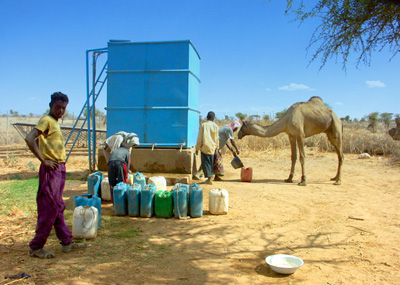 |
|
|
|
Renovation or Construction of
Two New Water
Reservoirs in the
Refugee
Settlement Gemah
Background:
Since
the
last
boundary
dispute
between Eritrea and Ethiopia, many people, predominantly
Muslim
refugees have come to Gemah near the Ethiopian border.
They know that they can not return to their old homeland
villages
because of the new demarcation. The drinking water supply
could no longer withstand the onslaught of so many humans.
The early risers had to stand
in
line at three o'clock in the morning by a hand pump in
order
to receive water for their families. In 2004 the WaterFoundation
set up a solar-powered water supply for 6000
local
people with the help of the Foreign Office of the Federal
Republic of Germany. (see Completed projects). Our partner
the “Capuchin’s sisters”, contrary to
our plan, set up two steel tanks instead of two bricked
water reservoirs. The reason was the unstable situation
at the border region of Ethiopia. The water supply installation
was supposed to be easily collapsible so that it could
be quickly transported into a safe area. Today it is certain
that the refugees will remain here for the long term. Since
the mobile steel tanks were deformed because of the high
temperatures, the welded joints began to rust, which is
detrimental to the water quality.
Goal
In
2008
we
plan to restore the two steel tanks or replace them with
brick cisterns so that we can provide a sufficient amount
of
clean water. To prevent the water from warming up, we intend
to plant trees to provide shade.
Partner
"Vision Eritrea"
Expenses
At the present time, we solicit quotations.
Concurrently experts will examine on-site whether the renovation of the steel
tanks is wise.
Thereafter the actual costs can be specified.
Monitors
WaterFoundation,
Capuchin’s Sisters, "Mother Rubatto" in
Eritrea.
Realization
The
two steel tanks are to be restored in 2008 or replaced
with brick reservoirs.
Contact Person
Ernst
Frost
Phone:
+49
(0)
8178/998418
E-Mail:
wasserstiftung@t-online.de |
|
|
|

Ghana
|
|
|
|
Waterschool in Ghana
Background and Circumstances
In order to improve the educational and economical situation
in the villages of Kokrobite and Langma, the Non-Governmental
Organization INITIATIVE BOKEMI is building a school
in
Billerbeck for 150 children. These fishing villages are approximately
30 km away from the capital Accra, direct on the gulf of
Guinea´s coast. The population lives predominantly
on
fishing. The families have a monthly average income of about
60 Euros and must support
4-5 children. Also the cost of living rose drastically in Ghana. Until
now, many children have no access to education, because on one hand they can
not afford school materials and school clothes, and on the other hand their
manpower is needed in the families.
Parents regard the local opportunity of schooling and training
as a big chance to counteract the migration into cities by
the young people and to develop future prospects in the villages,
for example through the establishment of small handicraft
and service businesses. In the long run the "Free
Education School" is also to be expanded by a training
centre.
An important component in this connection is drinking water.
The
village Langma to this day still has no drinking water supply.
The women and children collect the water daily from about
3km away inshore.They use this water not only for washing
purposes, but drink it also. A water pump is planned on the
campus to provide the students and the village community
with clean drinking water.
Goal
Local sustainable land management practices and drinking water supply for
students and families. The extension of the school to a WaterSchool: (water topics
in the curriculum, practice in the school garden, formation of “Water Club” – See
under Project WaterSchool).
Partner
INITIATIVE
BOKEMI in
Billerbeck
and
in
Ghana.
Expenses
Approximately
7,000 Euro
Realization
The
installation of a well and a cesspit, and sanitation for
the school, the school kitchen and the school garden are
still intended for 2007.
Contact Person of the WaterFoundation in Ghana
Jacob
Nii Amu Ankrah of the INITIATIVE BOKEMI in Accra/Ghana.
Contact Person
Ernst
Frost
Phone:
+49
(0)
8178/998418
E-Mail:
wasserstiftung@t-online.de
|
|
|
|
|
|
|

